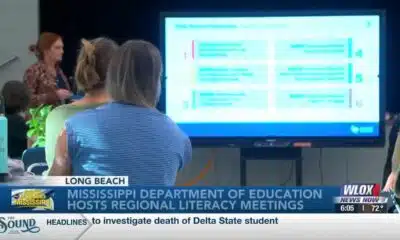News from the South - Alabama News Feed
Red Couch: Fall Mums Tips
SUMMARY: As fall approaches, Bellingrath Gardens is highlighting the care of mums, which thrive in Mobile. To successfully grow mums, plant them in a location that receives at least six hours of sunlight daily and water them in the morning to prevent root rot. Pinch back the plants mid-summer for a bushy appearance, and deadhead spent flowers as needed. Use a balanced fertilizer, like Miracle Grow, but reduce application as flowers bloom. Mums may be affected by pests like aphids and mealybugs, which can be treated with insecticidal soap. Visit Bellingrath Gardens for more tips and seasonal displays during the upcoming Great Bellingrath Harvest.
WKRG News 5’s Bill Riales and Shamonee Baker talk fall plant tips with Bellingrath Gardens.
News from the South - Alabama News Feed
A very dry September forecast with hot afternoons ahead for Alabama.
SUMMARY: Alabama faces a very dry September with hot afternoons continuing through the last week of summer before the autumnal equinox. Sunday begins comfortably cool in the 60s, warming to low 90s by mid-afternoon under mostly sunny skies. A weak wave may bring a few showers tonight, mainly to northwest Alabama, but widespread rain is unlikely. Temperatures will remain above average, hitting mid-90s Tuesday and Wednesday. By next weekend, a trough and front may increase cloud cover and rain chances slightly, potentially lowering temperatures closer to average. Overall, the forecast calls for persistent dry and warm conditions into next week.
A very dry September forecast with hot afternoons ahead for Alabama.
WVTM13 is your home for Alabama breaking news and weather. For your latest Alabama news and weather visit: https://www.wvtm13.com/
For licensing inquiries: https://www.wvtm13.com/licensing
News from the South - Alabama News Feed
Huntsville Fire & Rescue Holds 9/11 Memorial Service | Sept. 11, 2025 | News 19 at 5 p.m.
SUMMARY: On September 11, 2025, Huntsville Fire & Rescue held a memorial service to honor the nearly 3,000 lives lost in the 9/11 terrorist attacks. Military members and first responders gathered at Huntsville Fire Station One, where at 7:46 a.m., lights, sirens, and air horns sounded to replicate the sounds heard during the attacks. Fire Chief Howard McFarland emphasized the importance of remembering the tragedy to educate younger generations and prevent history from repeating. Former Captain Lynn recalled the shock of witnessing the attacks and noted how 9/11 reshaped emergency preparedness. This annual event is held across all 20 Huntsville fire stations.
The Huntsville Fire & Rescue held a 9/11 memorial service.
News 19 is North Alabama’s News Leader! We are the CBS affiliate in North Alabama and the Tennessee Valley since November 28, 1963.
https://whnt.com/
https://www.facebook.com/whntnews19
https://www.instagram.com/whntnews19/
https://twitter.com/whnt
News from the South - Alabama News Feed
News 5 NOW at 8:00am | September 11, 2025
SUMMARY: On September 11, 2025, News 5 NOW covered 9/11 commemorations, including first responders climbing 2,000 steps at Hancock Whitney Stadium to honor the World Trade Center’s 110 stories. The Original Oyster House offered free meals to first responders in Mobile and Baldwin counties. The program also reported a new Vibrio bacterial infection case in Escambia County, highlighting health warnings for beachgoers. Additionally, they discussed a study linking chronic insomnia to increased dementia risk, election recounts in Gulf Shores, and a recent political shooting in Utah, sparking debate over harsher punishments for political violence. Viewer opinions on extraterrestrials and political violence were shared in an interactive social media segment.
First Responders in Mobile honored the heroes of September 11th, a Pensacola woman is in the hospital after being infected with the flesh eating bacteria vibrio vulnificus, and a vote re-count wrapped up in Gulf Shores…
-
News from the South - Kentucky News Feed7 days ago
Lexington man accused of carjacking, firing gun during police chase faces federal firearm charge
-
News from the South - Alabama News Feed7 days ago
Zaxby's Player of the Week: Dylan Jackson, Vigor WR
-
News from the South - Arkansas News Feed7 days ago
Arkansas medical marijuana sales on pace for record year
-
Local News Video7 days ago
William Carey University holds 'tailgates and tourniquets' blood drive
-
News from the South - Missouri News Feed7 days ago
Local, statewide officials react to Charlie Kirk death after shooting in Utah
-
News from the South - North Carolina News Feed5 days ago
What we know about Charlie Kirk shooting suspect, how he was caught
-
Local News7 days ago
US stocks inch to more records as inflation slows and Oracle soars
-
Local News6 days ago
Russian drone incursion in Poland prompts NATO leaders to take stock of bigger threats









































